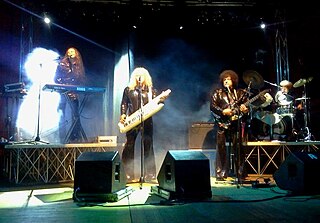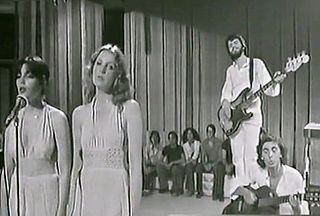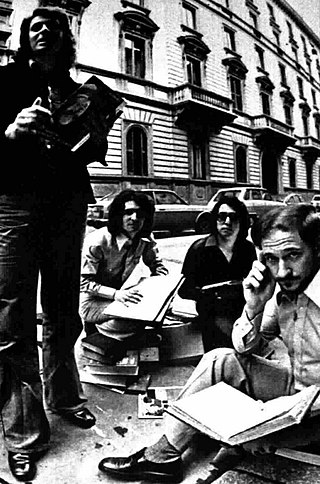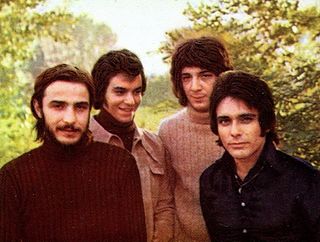Related Research Articles

Blood, Sweat & Tears is an American jazz rock music group founded in New York City in 1967, noted for a combination of brass with rock instrumentation. BS&T has gone through numerous iterations with varying personnel and has encompassed a wide range of musical styles. Their sound has merged rock, pop and R&B/soul music with big band jazz.

Eloy is a German rock band. Founded in 1969 by guitarist Frank Bornemann, the band is best known for their progressive rock music.

Kebnekajse is a Swedish band that was most active during the 1970s after its members left the Mecki Mark Men. The band was greatly influenced by both traditional Swedish folk music and African music. The name is taken from Kebnekaise, the highest mountain in Sweden. The spelling of the band name was originally the correct spelling of the mountain, but for the last two albums, it was changed it to the present spelling.

Premiata Forneria Marconi (PFM) is an Italian progressive rock band founded in 1970 which continues to the present day. They were the first Italian group to have success internationally. The group recorded five albums with English lyrics between 1973 and 1977. During this period they entered both the British and American charts. They also had several successful European and American tours, playing at the popular Reading Festival in England and on The Midnight Special, a popular national television program in the United States.
The Spiders from Mars were rock singer David Bowie's backing band in the early 1970s, and initially consisted of Mick Ronson on guitars, Trevor Bolder on bass guitar, and Mick Woodmansey on drums.

Banco del Mutuo Soccorso is an Italian rock band. A popular progressive rock band in the 1970s, they continued making music in the 1980s and 1990s. They were still active, playing live in 2001 and 2008 at NEARfest. Their charismatic frontman, Francesco Di Giacomo, died in 2014.

Le Orme is an Italian progressive rock band formed in 1966 in Marghera, a frazione of Venice. The band was one of the major groups of the Italian progressive rock scene in the 1970s. They are one of few Italian rock bands to have success outside their own country, having played concerts across North America and Europe, and releasing an album in English at the height of their success.

Il Balletto di Bronzo is an Italian progressive rock band from Naples. The band was initially formed as the I Battitori Selvaggi, and played Nato bases in Italy. Early members included Raffaele Cascone, a progressive guitarist and Freddy Cannon on drums. Cannon would later become a very successful record company executive with EMI, Carrere, PWL and join BMI as a senior executive in 1994. They changed their name to Il Balletto di Bronzo in 1969 and released two singles, Neve Calda / Comincio 'Per Gioco (1969) and Si, Mama Mama / Meditazione (1970). The albums Sirio 2222 and Ys followed, before they before disbanded in 1973.
Locanda delle Fate is an Italian progressive rock band from the end of the Italian progressive rock movement.

Sebastian Hardie were Australia's first symphonic rock band. They formed in Sydney in 1967 as Sebastian Hardie Blues Band but dropped the 'Blues Band' reference when they became pop-oriented. By 1973 they developed a more progressive rock style, and later performed as Windchase, but disbanded in 1977. An early member of Sebastian Hardie was Jon English, who starred as Judas Iscariot in the Australian version of the stage musical Jesus Christ Superstar in 1972 and subsequently had a solo career as a singer, actor and playwright. A later member, Mario Millo became a multi-award winner for his television and movie music.

I Cugini di Campagna is an Italian pop band formed in 1970 in Rome. They are well known for the use of falsetto and for their eccentric look, a cross between glam and kitsch.

Daniel Sentacruz Ensemble was an Italian pop group formed in 1974. Their first single "Soleado", a semi-instrumental track written by lead singer Ciro Dammicco and Dario Baldan Bembo, sold over five million copies in Europe, giving the band international popularity. In 1976 and in 1978 Daniel Sentacruz Ensemble entered the Sanremo Music Festival with the songs "Linda Bella Linda" and "1/2 notte". Unable to replicate their initial success, the group eventually disbanded in 1980.

Homo Sapiens is an Italian pop rock group who were mainly successful in the 1970s.

Denovo is an Italian new wave group formed in 1981 in Catania.

I Profeti were an Italian pop group, mainly successful in the late sixties and in the seventies.
Collage are an Italian pop music group, mainly successful in the 1970s.
La Bottega dell'Arte were an Italian pop band active between 1974 and 1985.

Il Giardino dei Semplici are an Italian pop-rock music group, mainly successful in the 1970s and 1980s. Formed in late 1974, throughout various decades they have released 17 studio records, 3 live albums, 18 singles and many Greatest Hits albums. They have sold 4 million records.

Dik Dik is an Italian beat/pop-rock band, named after the antelope Dik-dik, formed in the 1960s and still active. They were most popular in the late 1960s, when they released a string of hit singles with the contribution of renowned lyric-writer Mogol and songwriter Lucio Battisti, their greatest successes being "Sognando la California" and "Senza luce", respectively covers of "California Dreamin'" by the Mamas and Papas and "A Whiter Shade of Pale" by Procol Harum. While their early production is mostly inspired by the Beatles, in the 1970s they also experimented in other genres, including progressive rock. They went on hiatus in the 1980s but later returned to the scene, mostly in revival television shows and live performances.

Sugarfree is an Italian pop-rock band formed in 2000, best known for the song "Cleptomania".
References
- 1 2 3 4 5 Enrico Deregibus. Dizionario completo della Canzone Italiana. Giunti Editore, 2010. ISBN 8809756258.
- 1 2 3 4 Eddy Anselmi. Festival di Sanremo: almanacco illustrato della canzone italiana. Panini Comics, 2009. ISBN 8863462291.
- ↑ Cesare Rizzi, Fulvio Beretta. Enciclopedia del rock italiano. Arcana, 1993. ISBN 8879660225.
- ↑ M. Benedetti (5 December 2008). "Il ritorno dei Latte e Miele – Grande successo in Corea". La Nazione .
- ↑ Juan Mellado. "Interviste - Latte e Miele". Arlequins. Retrieved 18 June 2015.